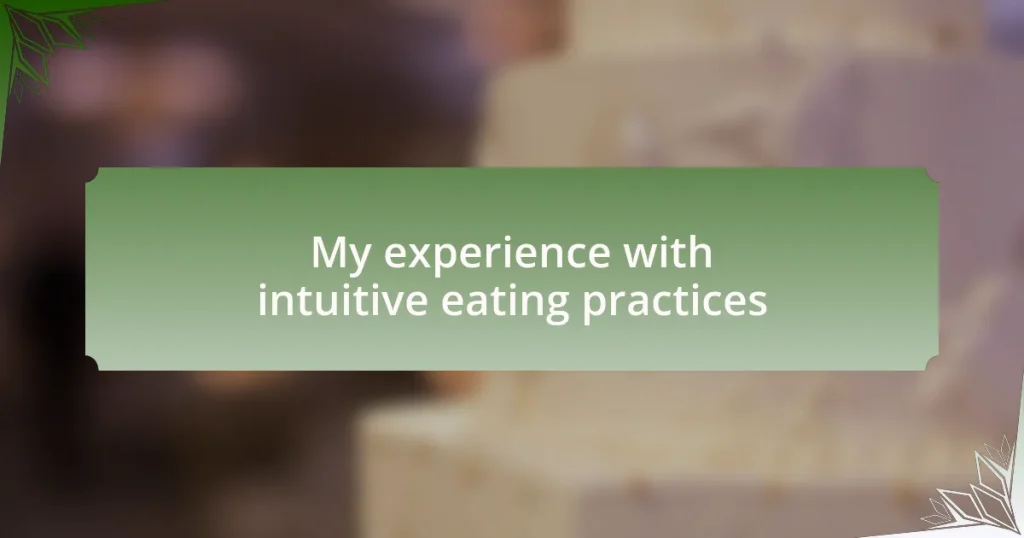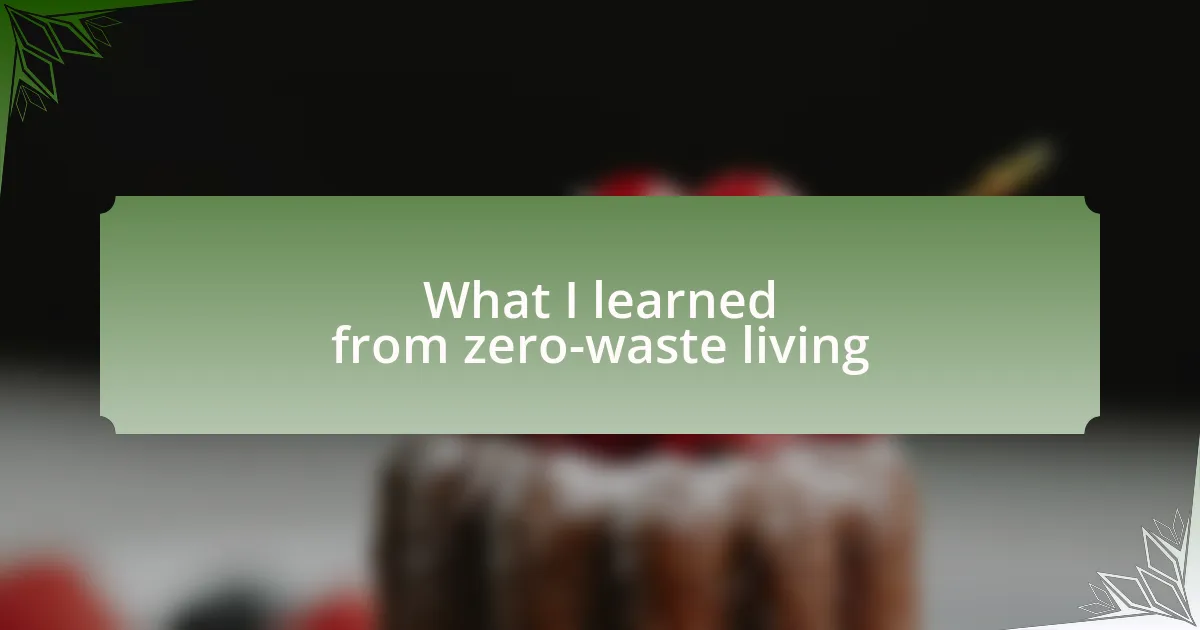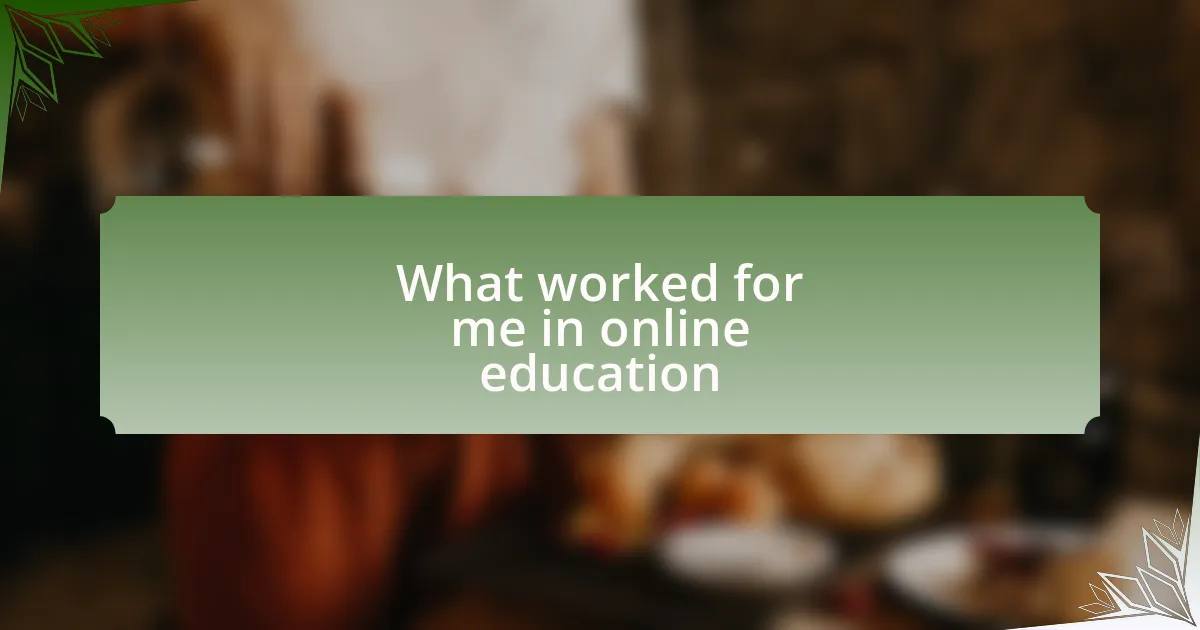Key takeaways:
- Intuitive eating promotes a positive relationship with food by encouraging individuals to listen to their body’s hunger cues and indulge in enjoyable moments without guilt.
- This approach fosters self-acceptance, allowing individuals to prioritize pleasure and create a balanced mindset toward food, especially during social events.
- Embracing intuitive eating leads to more mindful choices, enhancing the enjoyment of both food and social connections during celebrations.
- Celebrating with food becomes an enriching experience that emphasizes connection and joy, showcasing that meals can be more than just sustenance.
Author: Evelyn Carter
Bio: Evelyn Carter is an award-winning author known for her gripping psychological thrillers and captivating contemporary fiction. With a background in psychology, she skillfully weaves intricate character studies and suspenseful plots, engaging readers from the first page to the last. Her debut novel, “Shadows of the Mind,” was praised for its sharp insights and unexpected twists, earning her a place among the best new voices in literature. When she’s not writing, Evelyn enjoys exploring the great outdoors and volunteering at her local animal shelter. She lives in Portland, Oregon, with her two spirited rescue dogs.
Understanding intuitive eating practices
Intuitive eating practices focus on reconnecting with your body’s natural hunger cues rather than following restrictive diets. I remember a time when I was consumed by strict eating rules, which only left me feeling deprived. It was a revelation to learn that allowing myself to eat when I was hungry, rather than at set times, transformed my relationship with food.
Have you ever found yourself eating a slice of cake at a wedding, only to feel guilty afterward? I know that feeling all too well. Intuitive eating encourages us to enjoy these moments without judgment. It emphasizes mindful eating, where you savor each bite, allowing yourself to indulge without the burden of guilt—this is especially relevant in the context of celebrating life events.
At its core, intuitive eating is about self-compassion and understanding. I’ve personally woven this practice into my life by allowing myself to listen to what my body truly needs. I often ask myself: what would I truly enjoy right now? This simple question has opened a door to a more balanced and satisfying approach to eating, reminding me that food should be a source of joy, not stress.
Importance of intuitive eating
Intuitive eating holds immense importance as it fosters a positive relationship with food. I recall a wedding where I consciously chose to relish every flavor of the cake instead of worrying about the number of calories. This freedom allowed me to fully engage in the celebration, highlighting how intuitive eating can transform food experiences from sources of anxiety into moments of joy.
By tuning into our hunger and fullness signals, we create a healthier mindset toward food. I remember a time when a friend and I would feel the pressure to eat only the “healthy” options at gatherings, often missing out on special treats like wedding cake. Embracing intuitive eating taught me that prioritizing pleasure and listening to my body’s cues leads to a more balanced approach, reminding us that celebrations are meant to be enjoyed.
Moreover, intuitive eating encourages self-acceptance, which is crucial in today’s diet-centric world. I’ve often asked myself why I should deny the joy of cake at a wedding simply because of societal pressures. In exploring these feelings, I discovered that allowing myself to indulge without guilt is empowering, reinforcing the idea that food should nourish both body and soul during life’s significant moments.
How intuitive eating affects choices
When it comes to making choices around food, intuitive eating reshapes my perspective. I remember choosing a slice of red velvet cake at a friend’s wedding, guided by what I really felt like enjoying rather than strict dietary rules. This shift made me wonder: how often do we overlook what our bodies truly desire in favor of arbitrary guidelines?
Intuitive eating empowers me to savor each moment and each bite without the shadow of guilt. Recently, during a family gathering, I relished not just the food but the conversations that came with it. It struck me how I once would have fretted about indulging, but now I appreciate that these social connections enhance my experiences with food.
Moreover, I find that tuning into my cravings leads to more mindful choices. For instance, when presented with a dessert table, instead of feeling overwhelmed, I now ask myself what I genuinely want. The freedom to choose from a place of awareness—not obligation—has deepened my connection to food and those around me. Isn’t it liberating to think that the choices we make can be rooted in joy and satisfaction?
My journey with intuitive eating
My journey with intuitive eating has been quite transformative, especially when navigating social events. I vividly recall attending a friend’s engagement party where the dessert table was laden with options. I took a moment to close my eyes and ask myself, “What do I truly crave right now?” The answer was a classic chocolate mousse, and savoring that rich flavor while chatting with friends felt so much better than mindlessly sampling everything.
There have been times when I struggled with guilt about what I was eating, but intuitive eating has changed that narrative for me. At my cousin’s wedding, I felt a wave of relief wash over me when I decided to enjoy the wedding cake without hesitation. It was a joy to fully immerse myself in the sweetness of the moment, rather than stressing about calories. Isn’t it amazing how food can unite us, just like love does at these celebratory gatherings?
Reflecting on my experience, I find intuitive eating has opened a door to self-discovery. I’ve learned to embrace my cravings rather than shun them. For example, during a cozy family dinner, I chose a slice of pie not just because it was delicious, but because it brought me closer to the warm memories associated with that dish. This journey encourages me to trust my body and reminds me that eating is about so much more than just sustenance—it’s about connection and joy.
Celebrating with joyful eating practices
Celebrating with food has become a joyful practice in my life, especially during significant events. I remember a recent wedding where the buffet was a beautiful array of colors and flavors. Instead of racing through the line with a list of “healthy” choices in my mind, I paused to truly appreciate what was being offered. When I chose a delicious slice of carrot cake, it wasn’t just about satisfying hunger; it was about honoring the love and effort that went into each dish. Have you ever noticed how the right food at the right moment can evoke such happiness?
At a friend’s anniversary party, the cheese platter caught my eye. Rather than feeling guilty about indulging, I just enjoyed the taste. I relished each bite alongside laughter and stories, realizing that sharing food creates bonds that last far beyond the event itself. The experience reminded me: isn’t it incredible how food can be a vessel for joy and connection? Each bite became a celebration of life’s moments, infusing them with meaning.
I’ve discovered that when we let go of stringent rules around food, we invite more joy into our lives. I recall sharing a dessert with my partner—a pistachio baklava. Every flaky layer we pulled apart was a reminder that food can be experienced together, and there’s something so heartwarming in that shared experience. Isn’t it freeing to think that meals don’t have to be solely about nourishment, but can also celebrate togetherness? Through these moments, I’ve learned that joyful eating enriches our connections and nurtures our souls, especially during celebrations.




